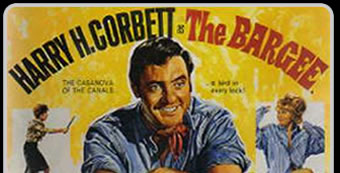
 |
|||
Steptoe and Son
This is a graphical insert for the Steptoe and Son Appreciation Society Website
|
The Bargee |
Buy the Steptoe and Son films from our shop |
| Steptoe and Son (film) Steptoe and Son is a 1972 British comedy drama film and a spin-off from the popular British television comedy series of the same name about a pair of rag and bone men. It starred Wilfrid Brambell and Harry H. Corbett as the eponymous characters and also featured Carolyn Seymour. Plot
Hemel (Harry H. Corbett) and Ronnie (Ronnie Barker) work the canals. They pick up goods and transport them along Victorian waterways to wherever they are needed. They are not just part of an industry, but a British culture. A network of canal-men, lock-keepers, publicans and their families who live a life that is under tremendous pressure from the expansion of the British motorway system (and given that it takes four days to transport a load of jam from the southeast to Birmingham, this seems hardly surprising). This lifestyle is tremendously attractive to blokes like Hemel as it means that they can live as romantic outsiders with girls in every port. Indeed, Corbett portrays Hemel as a combination of David Essex and Jack Kerouac - a creature of swarthy good looks, twinkling blue eyes, artfully distressed denim and buffoonish priapism. The economic pressures upon the canal industry is neatly mirrored in the social pressures upon Hemel, the world wants him to settle down with a house and a steady job and his old girlfriends want him to marry them. Hemel's refusal to accept either economic or social reality is what drives the plot through a series of comedic set-pieces in which Ronnie runs interference while Hemel gets his end away with the local beauties. There is a tangible sense of impending doom hanging over Hemel and Ronnie's lifestyle. Everywhere they go they are offered the chance to 'become normal' and 'fit in'. In fact, their mode of existence is so threatened that the pair brush up against an upper-class intellectual played by Eric Sykes who is intent upon documenting the lives of the canal-men before they become extinct. Eventually, things come to a head when one of Hemel's girlfriends becomes pregnant. Her father (Hugh Griffith) shuts the locks and holds the entire system hostage until Hemel comes forward and admits that he is the father of the unborn child. This event not only seals the fate of the canal-men, it also seals the fate of Hemel who finds himself having to settle down in a house and job in order to feed his new wife and future child. The Bargee's biggest problem lies in the creative talent of its writers. Galton and Simpson remain hugely acclaimed writers to this day but the sad truth is that they are better remembered for their commitment to social realism than they are for their actual comedy. Indeed, ask people to describe Steptoe And Son and you will most likely get some talk about generational differences and class attitudes, but ask them to remember the jokes and you will probably get the pickled onions in the bath and very little else. Indeed, The Bargee is a film that works wonderfully as an examination of a world in decline it is comparable to works such as James Curtis' examination of the road haulage business They Drive By Night (1938), but as a piece of comedy it is decidedly hit and miss with many of the jokes being overly contrived spins on the old staple of British men as little more than excitable schoolboys. Also regrettable is the film's soft ending wherein Hemel and his new wife head out on the boats knowing full well that the canal is about to be shut down. This ending is not only frustrating from the point of view of characterisation as it deprives us of the pleasure and/ or pain of seeing Hemel find his way in the real world, it also serves to completely undermine the entire thematic thrust of the film by giving an impression of infuriating ambivalence and evasion: The Bargee is a film all about a dying world. Galton and Simpson present this world to us and explain the reasons why it is disappearing. They also give us Hemel, a sympathetic character who clings tightly to this dying world. In order to square this dramatic circle, Galton and Simpson needed either to go for a tragic ending in which Hemel sacrificed his happiness in order to stay within that world (think of Tom Cruise's character in 2003's The Last Samurai), or they needed to show us Hemel managing to find a place for himself in the new world thereby acknowledging the power of social change and the need to move on. However, Galton and Simpson refuse to go down either path, deciding instead to have Hemel and his new bride go back to the boats knowing full well that they will be in exactly the same position 18 months down the line when the canals are finally shut down definitively. This unconvincing attempt at combining the two approaches to a dying world tries to combine the romanticism of sacrifice with the happiness of moving on but in reality all it does is suggest that the film's plot will only be resolved off-screen. This makes for astonishingly frustrating viewing. Despite problems with the script, The Bargee remains a well acted and beautifully shot look at an aspect of British life that simply no longer exists. It contains some neat moments of comedy and some lovely performances but it could have been so much more. The DVD comes with an admittedly quite funny trailer as its only extra. |